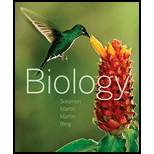
Biology (MindTap Course List)
11th Edition
ISBN: 9781337392938
Author: Eldra Solomon, Charles Martin, Diana W. Martin, Linda R. Berg
Publisher: Cengage Learning
expand_more
expand_more
format_list_bulleted
Concept explainers
Question
Chapter 30.3, Problem 3C
Summary Introduction
To explain: The way in which the discovery of Hox genes helped biologists to understand animal evolution.
Concept introduction: Animal phylogeny is a rapidly changing field. Even if the members of animal kingdom are incredibly diverse, there are various animals sharing certain features that differentiate them from other organisms of the kingdom. Biologists mostly depend on the fossils to compare the similarities of body plan and the pattern of development to determine the evolutionary relationships among various animal groups.
Expert Solution & Answer
Want to see the full answer?
Check out a sample textbook solution
Students have asked these similar questions
help tutor please
Q8. A researcher wants to study the effectiveness of a pill intended to reduce stomach heartburn in pregnant
women. The researcher chooses randomly 400 women to participate in this experiment for 9 months of their
pregnancy period. They all need to have the same diet. The researcher designs two groups of 200 participants:
One group take the real medication intended to reduce heartburn, while the other group take placebo
medication. In this study what are:
Independent variable:
Dependent variable:
Control variable:
Experimental group: "
Control group:
If the participants do not know who is consuming the real pills and who is consuming the sugar pills.
This study is
It happens that 40% of the participants do not find the treatment helpful and drop out after 6 months.
The researcher throws out the data from subjects that drop out. What type of bias is there in this study?
If the company who makes the medication funds this research, what type of bias might exist in this
research work?
How do I determine the inhertiance pattern from the pedigree diagram?
Chapter 30 Solutions
Biology (MindTap Course List)
Ch. 30.1 - Prob. 1LOCh. 30.1 - Prob. 1CCh. 30.2 - Compare the advantages and disadvantages of life...Ch. 30.2 - What are some advantages of marine environments...Ch. 30.2 - Prob. 2CCh. 30.3 - Prob. 3LOCh. 30.3 - Prob. 1CCh. 30.3 - Prob. 2CCh. 30.3 - Prob. 3CCh. 30.4 - Describe how biologists use morphology (including...
Ch. 30.4 - Cite specific examples of how data from molecular...Ch. 30.4 - Prob. 1CCh. 30.4 - What are some differences between protostomes and...Ch. 30.4 - Prob. 3CCh. 30 - Which of the following is not a characteristic of...Ch. 30 - Which of the following is not an adaptation to...Ch. 30 - The Cambrian radiation (a) occurred during the...Ch. 30 - The germ layer that gives rise to the outer...Ch. 30 - Prob. 5TYUCh. 30 - Prob. 6TYUCh. 30 - Prob. 7TYUCh. 30 - Prob. 8TYUCh. 30 - Prob. 9TYUCh. 30 - Prob. 10TYUCh. 30 - Prob. 11TYUCh. 30 - EVOLUTION LINK Examine the cladogram in Figure...Ch. 30 - Prob. 13TYUCh. 30 - Prob. 14TYU
Knowledge Booster
Learn more about
Need a deep-dive on the concept behind this application? Look no further. Learn more about this topic, biology and related others by exploring similar questions and additional content below.Similar questions
- 22. Which of the following mutant proteins is expected to have a dominant negative effect when over- expressed in normal cells? a. mutant PI3-kinase that lacks the SH2 domain but retains the kinase function b. mutant Grb2 protein that cannot bind to RTK c. mutant RTK that lacks the extracellular domain d. mutant PDK that has the PH domain but lost the kinase function e. all of the abovearrow_forwardWhat is the label ?arrow_forwardCan you described the image? Can you explain the question as well their answer and how to get to an answer to an problem like this?arrow_forward
- Describe the principle of homeostasis.arrow_forwardExplain how the hormones of the glands listed below travel around the body to target organs and tissues : Pituitary gland Hypothalamus Thyroid Parathyroid Adrenal Pineal Pancreas(islets of langerhans) Gonads (testes and ovaries) Placentaarrow_forwardWhat are the functions of the hormones produced in the glands listed below: Pituitary gland Hypothalamus Thyroid Parathyroid Adrenal Pineal Pancreas(islets of langerhans) Gonads (testes and ovaries) Placentaarrow_forward
arrow_back_ios
SEE MORE QUESTIONS
arrow_forward_ios
Recommended textbooks for you
 Biology (MindTap Course List)BiologyISBN:9781337392938Author:Eldra Solomon, Charles Martin, Diana W. Martin, Linda R. BergPublisher:Cengage Learning
Biology (MindTap Course List)BiologyISBN:9781337392938Author:Eldra Solomon, Charles Martin, Diana W. Martin, Linda R. BergPublisher:Cengage Learning Biology: The Dynamic Science (MindTap Course List)BiologyISBN:9781305389892Author:Peter J. Russell, Paul E. Hertz, Beverly McMillanPublisher:Cengage Learning
Biology: The Dynamic Science (MindTap Course List)BiologyISBN:9781305389892Author:Peter J. Russell, Paul E. Hertz, Beverly McMillanPublisher:Cengage Learning Biology 2eBiologyISBN:9781947172517Author:Matthew Douglas, Jung Choi, Mary Ann ClarkPublisher:OpenStax
Biology 2eBiologyISBN:9781947172517Author:Matthew Douglas, Jung Choi, Mary Ann ClarkPublisher:OpenStax Biology Today and Tomorrow without Physiology (Mi...BiologyISBN:9781305117396Author:Cecie Starr, Christine Evers, Lisa StarrPublisher:Cengage Learning
Biology Today and Tomorrow without Physiology (Mi...BiologyISBN:9781305117396Author:Cecie Starr, Christine Evers, Lisa StarrPublisher:Cengage Learning Biology: The Unity and Diversity of Life (MindTap...BiologyISBN:9781305073951Author:Cecie Starr, Ralph Taggart, Christine Evers, Lisa StarrPublisher:Cengage Learning
Biology: The Unity and Diversity of Life (MindTap...BiologyISBN:9781305073951Author:Cecie Starr, Ralph Taggart, Christine Evers, Lisa StarrPublisher:Cengage Learning

Biology (MindTap Course List)
Biology
ISBN:9781337392938
Author:Eldra Solomon, Charles Martin, Diana W. Martin, Linda R. Berg
Publisher:Cengage Learning

Biology: The Dynamic Science (MindTap Course List)
Biology
ISBN:9781305389892
Author:Peter J. Russell, Paul E. Hertz, Beverly McMillan
Publisher:Cengage Learning

Biology 2e
Biology
ISBN:9781947172517
Author:Matthew Douglas, Jung Choi, Mary Ann Clark
Publisher:OpenStax

Biology Today and Tomorrow without Physiology (Mi...
Biology
ISBN:9781305117396
Author:Cecie Starr, Christine Evers, Lisa Starr
Publisher:Cengage Learning


Biology: The Unity and Diversity of Life (MindTap...
Biology
ISBN:9781305073951
Author:Cecie Starr, Ralph Taggart, Christine Evers, Lisa Starr
Publisher:Cengage Learning
The Evolution of Populations: Natural Selection, Genetic Drift, and Gene Flow; Author: Professor Dave Explains;https://www.youtube.com/watch?v=SRWXEMlI0_U;License: Standard YouTube License, CC-BY
The Evolution of Humans | Evolution | Biology | FuseSchool; Author: FuseSchool - Global Education;https://www.youtube.com/watch?v=Vf_dDp7drFg;License: Standard YouTube License, CC-BY